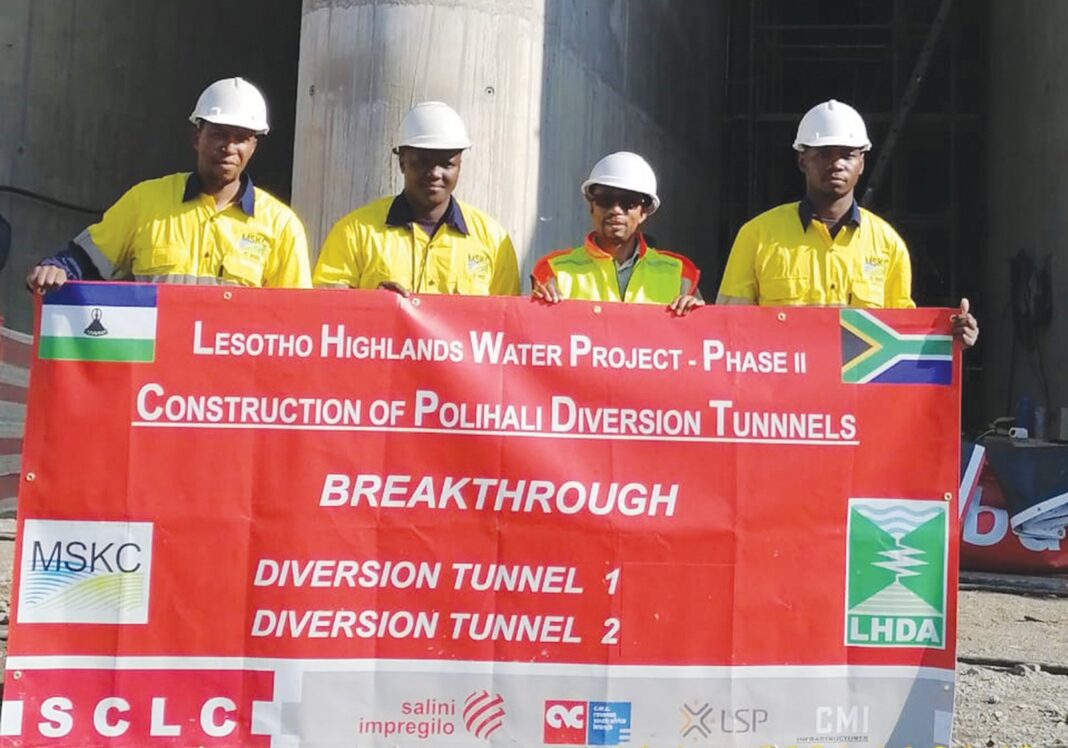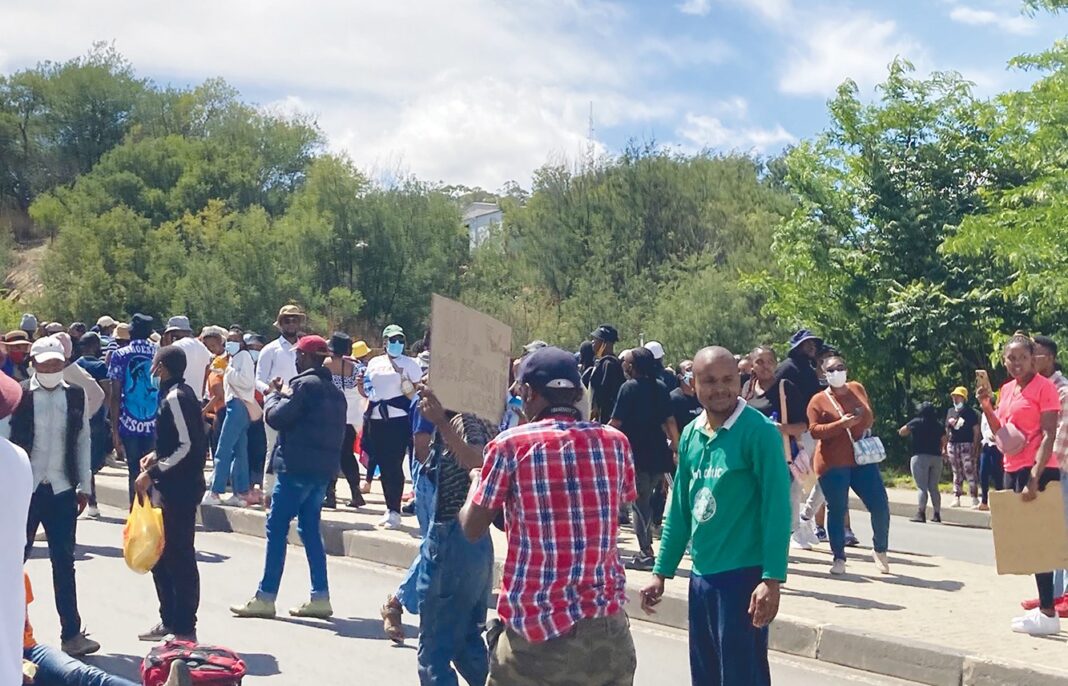By ‘Majirata Latela
The construction of the Polihali Dam which is the centrepiece of Phase II of the Lesotho Highlands Water Project is said to be progressing very well as the underground tunnelling on the two Polihali diversion tunnels is said to have reached a major milestone with a double breakthrough of the two diversion tunnels in August 2021.
According to Lesotho Highlands Development Authority (LHDA) the breakthrough marks the completion of 1,870 metres of the tunnel excavation and is a significant step in Phase II construction
The LHWP is a project meant to build several dams in Lesotho to capture the waters of the upper Orange River basin and reverse part of its flow in order to provide South Africa, and in particular the Johannesburg region, with drinking water. Two tunnels are under construction to supply the Polihali Dam.
The dam will store part of the waters of the Orange River (Senqu) and the Khubelu River. Its concrete rock fill wall will be 165m high with a ridge length of 921m and a ridge width of 9m. At its base, the slope will be 470m wide. The dam will have a spillway with a concrete side channel spillway.
According to LHDA’s public relations manager, Masilo Phakoe the construction of Polihali is at its second phase of the project which will from mid -year 2022 the construction of the initial dam will commence as they tunnelling will very soon be completed after a breakthrough was done.
He said some of the milestones the project has reached include the registration of unskilled job seekers. The Project Labour Recruitment Desk has placed 1,297 people from villages within a five kilometre radius of the advance infrastructure areas with different contractors for unskilled positions.
Two thousand and thirty-eight skilled and semi-skilled personnel are engaged by the different Phase II construction contractors; of whom 1, 637 are Lesotho nationals while the remainder are from South Africa and other countries. At the peak of construction, Phase II is expected to create between 2,000 and 3,000 unskilled job opportunities for Lesotho nationals.
On skills development he said the LHDA young professionals programme (YP) has recruited 33 young professionals. They are placed within 12 consultancy contracts in engineering and social programmes, the Polihali Dam, the Polihali Transfer Tunnel, major bridges, housing and access roads as well as with the resettlement and cultural heritage consultants.
He added that the programme equips young professionals with on the job practical skills that increase their competitiveness in the job market. It is open to Lesotho and South African nationals, newly qualified professionals under the age of 35 years and requires diploma and degree holders in the fields of civil and structural engineering, electrical engineering, geotechnical engineering, surveying, quantity surveying, engineering, architecture, archaeology, environmental sciences, social and natural sciences and public health.
Other than the young professionals programme, LHDA has another skills development programme aimed at benefitting people in the project area.
The LHDA is partnering with the Lesotho ministry of education and training to develop and implement a skills development programme for communities in the LHWP area. The skills development programme will provide skills accreditation and certification to people who have the technical skills but have not been certified in vocational skills training.
Phakoe added that arrangements are being finalised for the launch of the trades testing and accreditation project: three testing sites have been identified with other possible sites are being considered to facilitate easy access by all the candidates. Examiners and moderators for the programme have been recruited. It is anticipated that the trades testing and accreditation programme will commence in August 2021.
On the issue of public health which has been an issue to the surrounding communities of Polihali as many young girls were be falling pregnant since the commencement of the project.
“LHDA is working with the ministry of health on a public health programme and both parties have signed a Memorandum of Understanding, which outlines the roles and responsibilities of each entity in the implementation of a Public Health Action Plan to minimise the impacts of the Project on the affected communities.
“Awareness campaigns about the health risks which include COVID-19, human trafficking, teenage pregnancies and HIV/AIDS continue for communities in the area.
“Partnership has also been formed with UNFPA and World Vision Lesotho to raise awareness of sexual exploitation and abuse in the project area. Consultations with the relevant stakeholders have commenced and finalisations are being made for the lists of village health workers and the training needs for the different health cadres,” Phakoe said.
On the progress of resettlement planning he said the registration and verification of affected assets has been completed for most project components, including the Polihali transfer tunnel. Verification activities are still in progress in the Polihali reservoir area. Completion of the registration of assets is estimated at 95 percent.
He added that consultations on replacement and housing designs have been completed with households to be relocated from the reservoir area and other project sites such as the access roads and site establishment area.
Consultations have been completed with households in the Polihali village area on the two resettlement site layouts for physically displaced households. The planning of resettlement sites for households to be relocated from the remainder of the reservoir area will be finalised this year.
He further indicated that the public gatherings to create awareness about a menu of viable, sustainable livelihood options to be considered for implementation by communities have been held in all areas within the area. The purpose was to prepare communities to take advantage of the opportunities created by the implementation of Phase II, in mitigation against the potential negative effects of the Project.
The consultant appointed to prepare the Phase II Social Development Master Plan continues to engage communities, He is to undertake transect walks in affected electoral divisions. The exercise is being carried out with the view to validate and confirm recommended priority projects that would enhance the quality of life of the communities in the LHWP II areas.








